“Hey Bruno, why do you want to go into consulting?”
I have heard this question in a consulting interview setting at least a few dozen times.
It’s such a simple question… How could anything go wrong?
Yet, I still remember the first time I answered it, in my very first consulting interview at BCG.
I’ll be blunt: my answer sucked.

I rambled some half-though-out reasons and tried to be clever. I was nervous. There was a case interview coming my way in a few minutes.
My mind was in the case, my heart was in the case. I had heard from everyone that THE CASE was the important part.
So I was nervous as hell.
There wasn’t much left of me to give a good answer to that simple question: Why Consulting?
As I interviewed in more and more firms, I got more practice. Every single interviewer would ask me that, often as the very first set of words that left their mouth.
Do the math…
If you apply to 10 firms and have 6 interviews with each them, you will suddenly see yourself answering “Why consulting?” about 60 times.
It gets boring. It gets predictable. You can almost answer it without thinking.
But you shouldn’t.
And deep down you know why.
This question matters.
A lot.
If it didn’t, no interviewer would ask it.
And yet, they do.
“Why consulting?” is important because it is the first question in most interviews. It sets the tone for the rest of the 60 minutes you’ll spend with the stranger in a suit that’s sitting in front of you.
It is also the kind of sneaky question that tests a ton of skills you’re not even aware of.
In this article I’ll show you exactly how to ace this question.
Here's what you’ll learn:
The three key reasons why 95%+ of interviewers ask this question and why it’s so important.
The 7 principles behind the perfect answer (most candidates only follow 2 or 3 of them).
The anatomy of the perfect answer (and the 3 elements every good answer has).
I’ve helped more than 100 candidates craft their answers for this exact question.
Today I want to help you. I want you to stand out in this simple (yet important) question that shows up in every single consulting interview.
So get yourself a piece of paper, a cup of coffee and let’s get to it!
Why do interviewers ask “Why consulting?” in every interview?
When I left McKinsey, I started coaching candidates for consulting interviews. It didn’t take me long to realize a lot of candidates didn’t spend a minute preparing an answer the “why consulting?” question.
One day I decided to ask them WHY.
Think about it… It’s the one question you’re ABSOLUTELY SURE to get in a consulting interview.
Their answer?
“Oh, the answer doesn’t count too much, does it? I mean, it’s a conversation starter, a formality… I just have to give them a few reasons and that’s good!”
Self-delusion is a real thing.
I’ll be straight to you: senior partners wouldn’t waste 5 minutes of their time asking a question “just as a formality”.
Yet, most senior partners will insist on asking this question in final rounds.
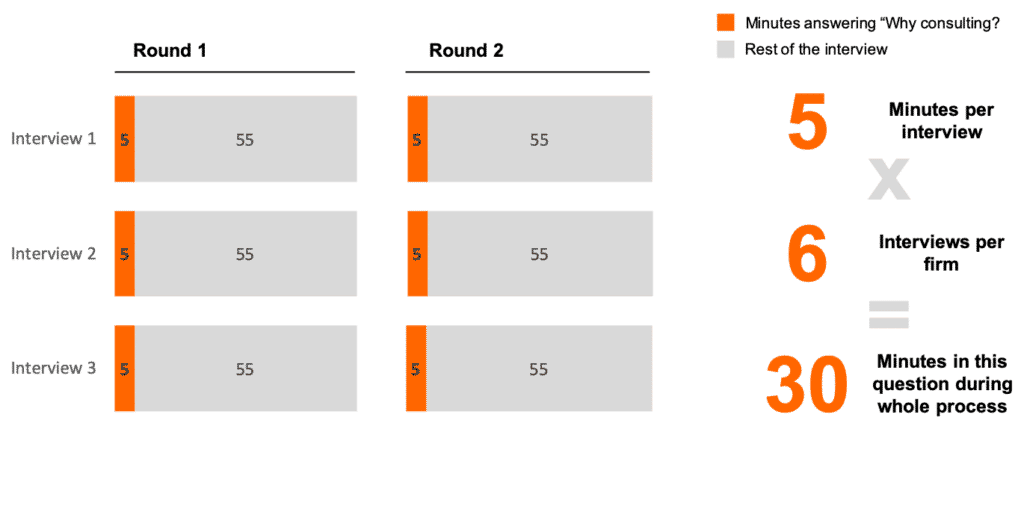
There’s no way consulting firms would waste 30 minutes of interview time asking the same question over and over again if it didn’t make sense to them.
What’s interesting is that they know that you were asked it several times before, in earlier rounds.
(And they know you gave a good enough answer since you’re sitting in front of them.)
So, why would they ask it again?
Isn’t redundancy and lack of focus in re-asking that question the anathema of effective management consulting?
I’ll tell you why they keep asking you this question over and over again in this article…
But before I do, I’ll help you figure it out yourself.
Compare these three (realistic) answers to the “Why consulting?” question…
We’ll go through the aspects that make them different later in the article. For now, just put yourself in the interviewer’s role and figure out which candidate you’d prefer and why.
Example 1: Johnny, the chaotic, distracted candidate.
Interviewer: “Hey Johnny, why do you want to be a consultant?”
Johnny: “So, that’s a really good question… You know, in university I really liked all sorts of classes, from business strategy to data analytics to the humanities… And then after graduating I got this job in performance marketing for a growing e-commerce company and while I liked the job and the activities, I felt something was missing…
Then a few months ago I was talking to a friend who’s a consultant in another firm and it really opened my eye that there are other careers that will use a broader skill set. I asked him some questions and from what I understood, my interest in several areas of knowledge would fit very well within a consulting firm.
And then there are all the other pros, right? For example, the learning, and the career opportunities, and the ability to work with decision makers. I’ll also put my excel abilities to use, which is pretty good…”
Alright, Johnny wasn’t so bad – he could’ve definitely done a worse job. But he is NOT going to leave a good impression from that question alone…
And by this point the interviewer has a feeling in the stomach that Johnny is not gonna do that well in the case either.
Not good, Johnny.
By the end of this article you’re gonna understand why (although I gave you a strong hint: he’s chaotic and distracted!)
Okay, let’s check out another answer.
Example 2: "To-The-Point" Tammy
Interviewer: “Hey Tammy, why are you interested in consulting?”
Tammy: “For three main reasons:
Reason #1 is the learning – I expect to learn a lot here.
Reason #2 is the breadth of types of projects. I think it’s important to be exposed to this variety of work early in my career. I want to be a good generalist before I specialize.
Finally, reason #3 is the structured career path. I’m an organized person and I like the fact that the career path and expectations are well-defined for each role.”
Again, not terrible. But not great.
Tammy is straightforward, which is good. But is the interviewer gonna remember her story 55 minutes from now, when they part ways and leave the interviewing room? Probably not. Her answer is not remarkable.
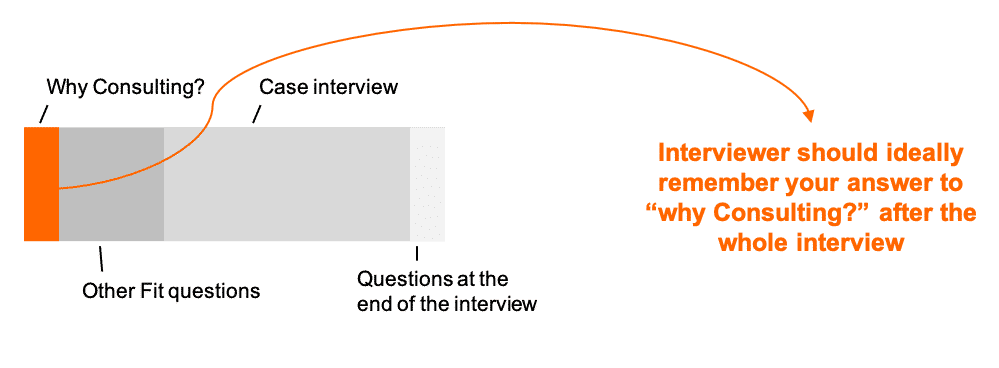
Now, the problem with Tammy or Johnny is NOT their reasons per se. The reasons are fine. The problem is in how they articulate those reasons to the interviewer.
Let me show you what I mean by contrast. Here’s an example of a top performing answer… Try to see if you can pick up some of the aspects that make this answer better:
By the end of this article you’re gonna understand why (although I gave you a strong hint: he’s chaotic and distracted!)
Okay, let’s check out another answer.
Example 3: Tracy, the Top Performer
Interviewer: “Hey Tracy, what brings you to consulting?”
Tracy: “You know, that’s a really good question. I think it’s three main things. First, the quality of the work you do. Second, the high exposure to senior people this early in my career. Third, the opportunity for an international career later on.
Let me explain why each one is important to me.
I think the main thing that draws me into consulting, and specifically to your firm, is the quality of the work you do. I was talking to [Consultant’s Name] in a networking event and he was telling me about how much work goes into each analysis. He told me of everything you do to sure that it will be relevant to the client, that it’s well executed and well presented.
I was so impressed when he was walking me through how you did it that I looked online for presentations you guys did. I found one for a public sector client and I fell in love with the work you did in [Project X]. There was so much detail and quality that I swore to myself I would work here.
In my last employer, I always pushed for more quality but if I’m honest to you I don’t think my boss valued it.
He was a great boss and all, but I know if I want to push my work’s quality to its highest I’ll need to be somewhere that values that. I could see from that presentation that here’s such a place.
So that was the first reason: the quality of the work that you do.
The 2nd reason relates to the exposure to senior people this early in my career.
My thinking here is that if I’m going to do high-quality work, I might as well do it in projects that matter. And I think a good proxy of how much a project matters is that senior people care about it.
So, this along with reason #1 creates a beautiful positive loop here. I do high-quality work for senior people in projects that matter. That makes me learn from them and improve my craft. I then get to better work at other high stakes projects.
I really think this would make me excited to wake up and go to work every Monday morning :).”
Interviewer: “But hey, you do know it’s not all roses and that there is some grunt work here and there, right?”
Tracy: “You’re right. I’ve talked to a couple of friends in consulting and they did emphasize that there is this part of the job. They mentioned several hours spend on cleaning datasets and formatting slides.
But I think being attentive to detail and to the process is important to learn any craft. And I wouldn’t mind doing that at all if that means having the opportunity to do important, high quality work for senior people!
And just to close my thinking here, there’s the third reason: the opportunity of an international career.
It’s not something that I think of in the next few years, but I’d love to have the opportunity to do work somewhere else in 5-10 years from now. I think that would be a very rich career opportunity.
Consulting is perfect for this. I know it’s tougher to get this in other career paths because breadth of knowledge is not as valued.
So, the more I talk to people, the more I think there’s a great fit between consulting and me. I also think consulting firms value people who want to do high-quality work and get better with time, is that true?”
One thing I know you noticed for sure: Tracy’s answer was by far the longest.
And you might think it’s counterintuitive that the longest answer is actually the best. Aren’t consultants direct and to-the-point?
But let me ask you one thing…
Once you finish reading this article, whose personality will you remember among our three hypothetical candidates?
Tracy’s, isn’t it? You probably don’t even remember what matters to Tammy anymore.
Also, notice that she’s not distracted like our old friend Johnny.
He’s all over the place.
Not Tracy.
Tracy’s answer is cohesive and tells a story. You know what matters to her, and it makes sense. You can see she did her work and really thought about it.
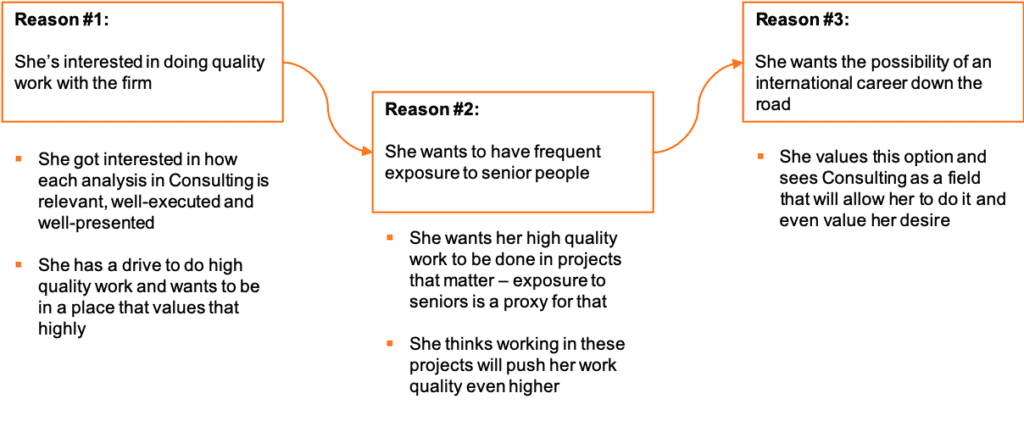
Your answer has to be highly organized, but also tell a story of who you are.
Finally, read her answer out loud and count how much time it takes to do so.
Okay, maybe you don’t want to read it out loud, so I’ll do it for you. It takes 3 minutes to say all those words. Johnny’s answer takes a minute and Tammy’s, 30 seconds.
But here’s the thing: your interviewer is not looking for shorter.
They’re looking for the best candidates.
If you give them the 30-second answer, they will need to ask follow-up questions to find out the real answer.
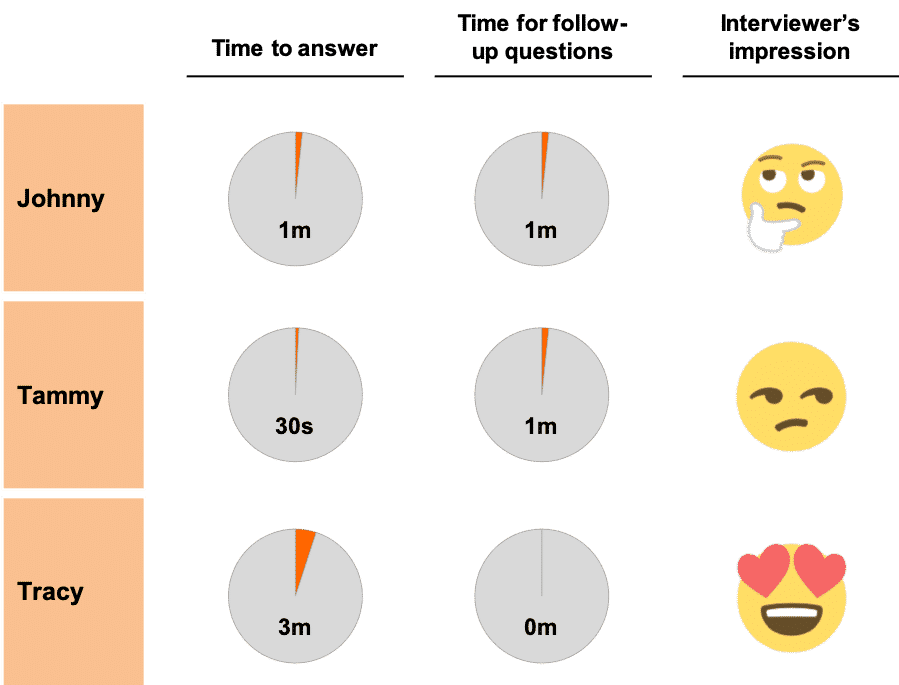
Being unstructured or leaving important details out of your answer may save you some time, but most of that time will be lost in follow-up questions and you’ll lose your chance of making a great first impression.
Tracy’s answer is a top performing one because (1) she answers the question directly, and (2) she can hear the “question behind the question” and then gives her interviewers exactly what they want to hear.
Throughout this guide, I’ll show you exactly how to do that.
But first, let me share with you the three reasons why consultants use this question to evaluate candidates.
These reasons aren’t so obvious, and will shine a light into why Tracy’s answer was the best.
Reason #1: They want to understand your enthusiasm in joining consulting

It’s way more fun to work with people who enjoy what they’re doing.
But there’s a more rational reason to overwhelmingly prefer people who REALLY want to work in consulting: employee attrition.
Most people don’t stay in consulting very long.
Anything between 30% and 50% of people who join these firms leave in the first couple of years after they’ve joined.
Attrition is high for several reasons: great exit opportunities, a tough lifestyle with long hours and tons of traveling, up-or-out policies.
And while that attrition rate is built-in the business model of consulting firms, the fact is that they DO want you to want to stay.
And if you don’t really care about being a consultant, chances are you won’t last many months. And you will underperform.
Interviewers gauge how much you want to work in consulting in part by how you answer the “why consulting?” question.
And they don’t just take the words that come out of your mouth in consideration. They also look for clues about how excited and enthusiastic you are as you answer the question.
Yes, consultants can feel feelings too 🙂
So one thing to show your interviewer is how enthusiastic you are in joining, while still communicating in a professional way.
Reason #2: To understand how much you understand the job is like
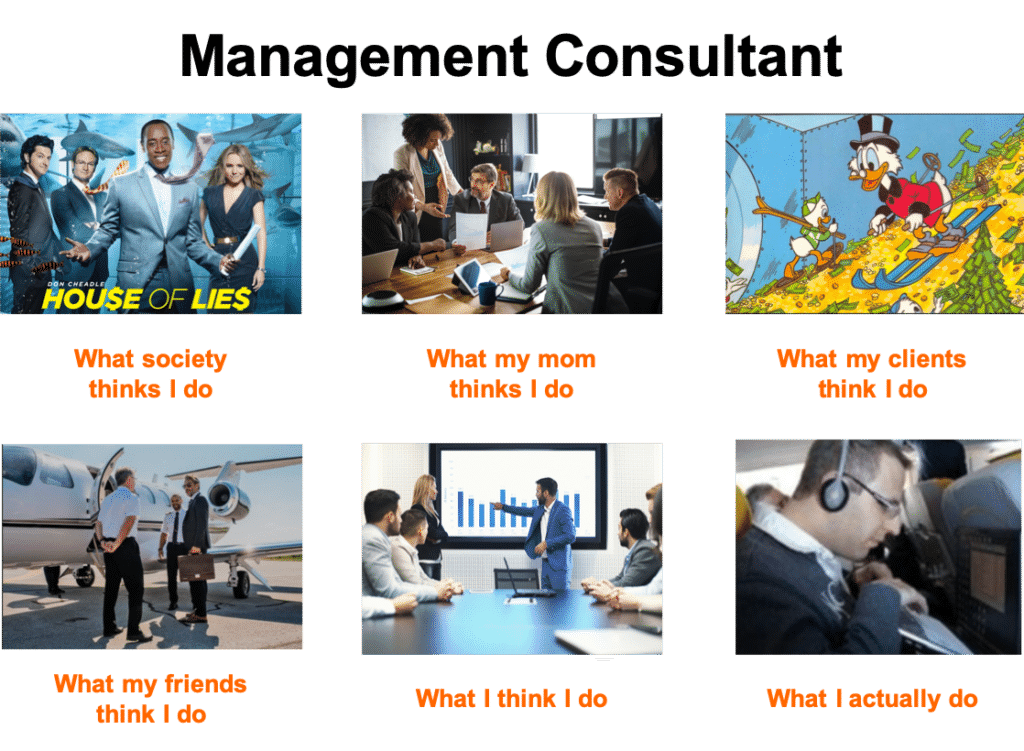
I have a friend whose childhood dream was to become a surgeon.
That is, until he watched a real surgery performed in the local hospital.
He IMMEDIATELY changed his mind.
He later told me he could never stand the pressure of having to work on a living person’s body while knowing that any mistake could lead to death.
There’s another name for being enthusiastic about a profession without knowing how it is in reality: naiveté.
Enthusiasm that’s grounded in realism about the downsides of the profession is much more trustworthy.
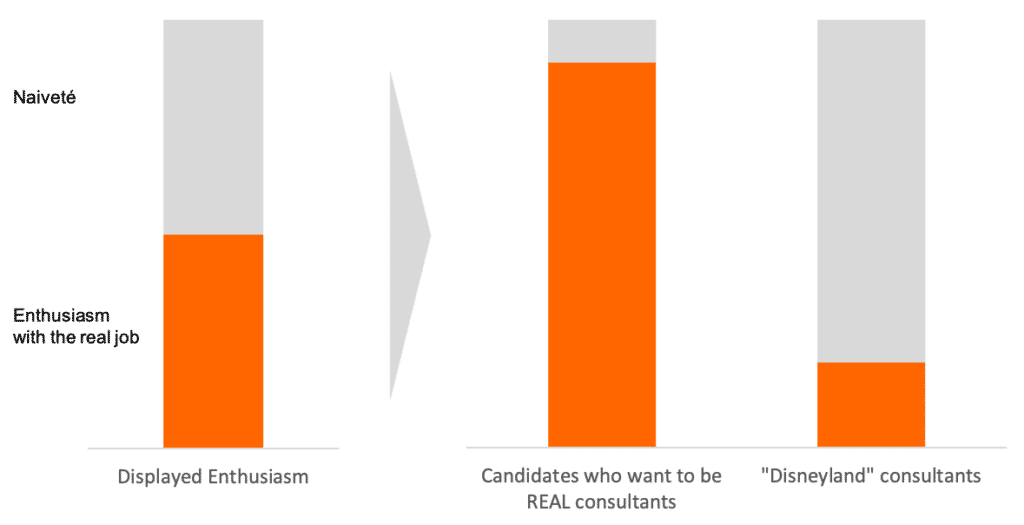
Consulting firms want candidates who want to be REAL consultants. What they want to avoid is candidates who want to be “Disneyland consultants”.
“Disneyland consultants” want to join consulting for all the wrong reasons.
They want to wine and dine in Michelin-starred restaurants. They want to fly business class and hang out by the pool at the Four Seasons.
And they think they should earn this because they will “explain” to seasoned executives their brilliant insights. (All while pleasing them with well-crafted words and analyses that are gonna save their businesses).
It’s easy for interviewers to know how much you understand about the realities of the job. All they have to do is ask you “Why consulting?” and then listen to your reasons and the details you use to back them up. Then they simply have to ask themselves: “does this match the job I do day in and day out?”
Reason #3: As a reality check of your consulting skills vs. the rest of the interview
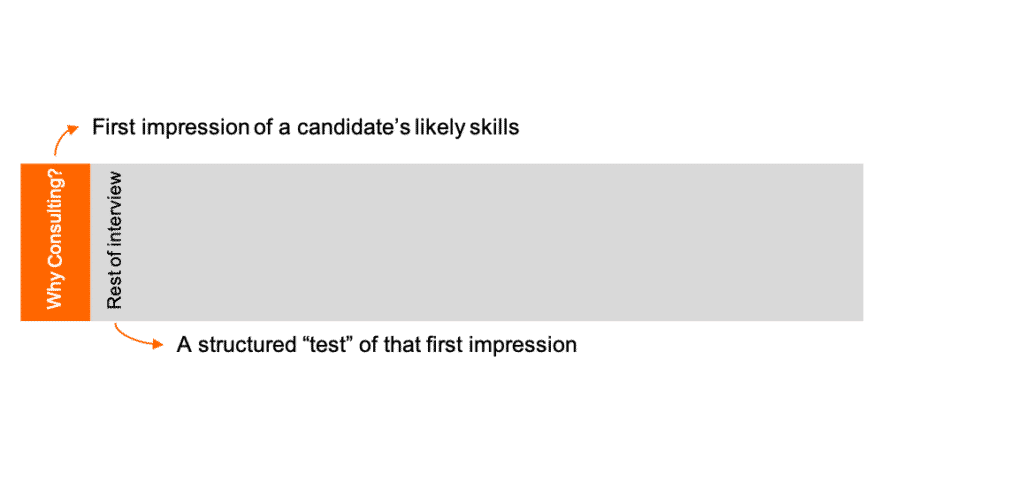
Unstructured in your answer to this question but structured during the case?
Odd. That should raise some yellow flags.
Told a great story on persuasion skills, but couldn’t convince the interviewer you really want into consulting?
Hmm, that’s weird…
“Why consulting?” is usually the first question in the interview, and to many candidates it seems inconsequential.
From the interviewer’s perspective, it’s the perfect opportunity to quickly get a sense of who you are. They can then use that sense as a “reality check” against everything else you show in the more “formal” parts of the interview, such as the case and the PEI.
In other words, “why consulting?” is the perfect question to ask if you want to create a first impression of the candidate.
7 Principles behind the Perfect Answer
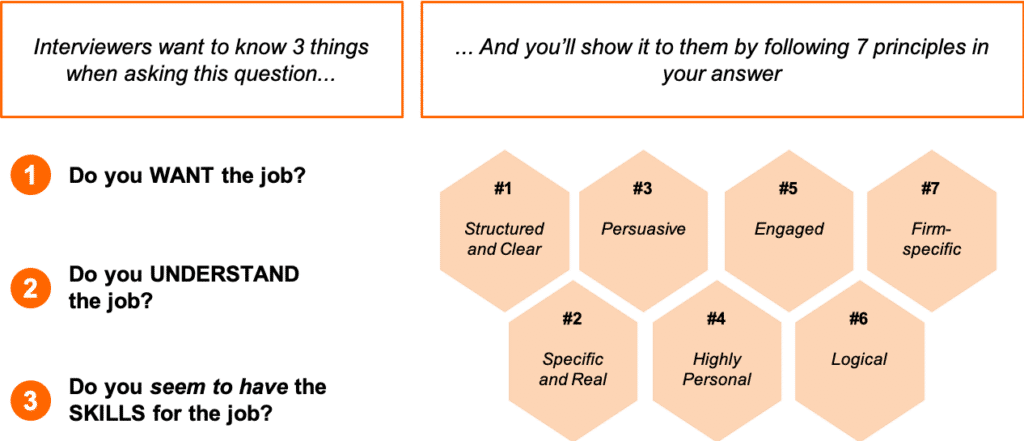
Alright, now you know exactly why this question is so critical to you and to your interviewer.
But how to answer it properly?
Before showing you the anatomy of the perfect answer, I want to go through the 7 principles that make and answer a perfect one.
These are the principles that made Tracy’s answer outstanding.
Following them will guarantee you’ll show your interviewers the three things they want to see. You’ll show them that you WANT this job, that you KNOW what it’s like and also give an early taste that you’ve got the SKILLS to do it.
Principle #1: Your answer must be structured and clear
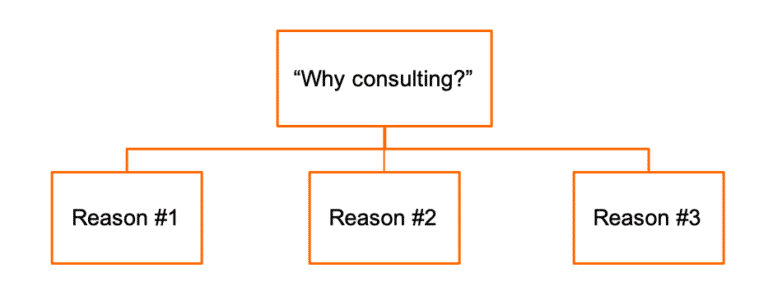
Your answer has to show you’ve carefully thought through why you want to be a consultant. It must also show you can lay out specific, non-overlapping reasons for wanting to work in this field.
Here’s how Tracy implements this early on in her answer:
“[…] I think it’s three main things. First, the quality of the work you do. Second, the high exposure to senior people this early in my career. Third, the opportunity for an international career later on.
Let me explain why each one is important to me. […]”
Tammy also does a good job at this – she lays out three reasons and they’re super clear, and distinct from one another.
Johnny’s answer, on the other hand, didn’t meet this principle.
He had a core idea, which is good, but it was hard to follow. After that, he dropped a laundry list of reasons that had no priority and overlapped each other.
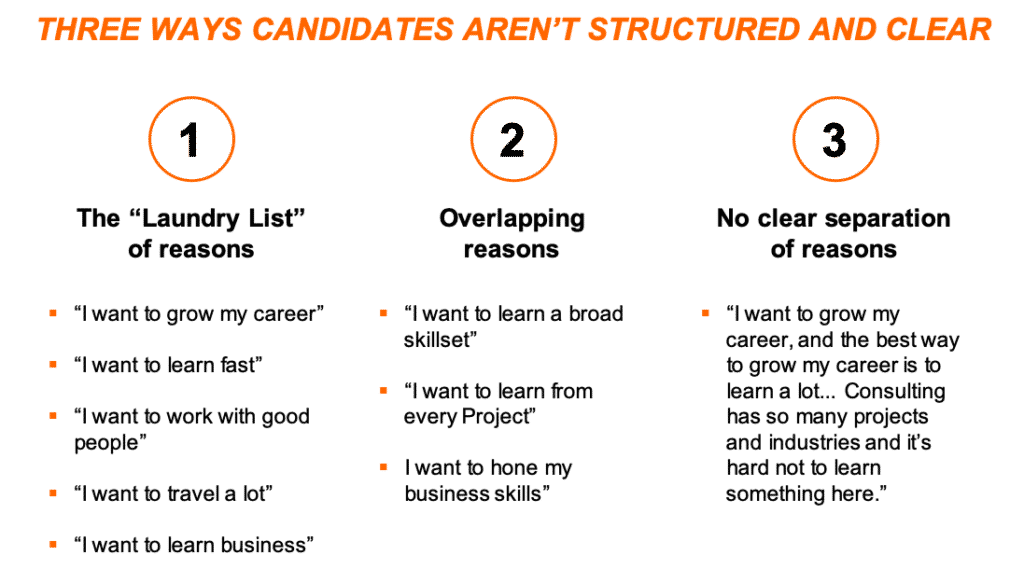
Being structured and clear in your answer is the most important principle.
Failing to do this brings up three hypotheses of red flags in your interviewer’s mind:
- Does this candidate really understand what the job is? From your interviewer’s perspective, if you can’t articulate the key reasons why you want to join in a clear manner, you might not understand the job.
- Does this candidate really wants to do this job? In case you do understand the job, maybe you can’t articulate it because you don’t really want it (or you don’t really know WHY you want it).
- Can this candidate only communicate in a structured way for a situation they have prepared for? Maybe you do understand the job and you do want it, but you have trouble speaking in a structured way. Speaking that way is critical for consulting, so this is a big red flag.
Principle #2: Your reasons must be specific and real
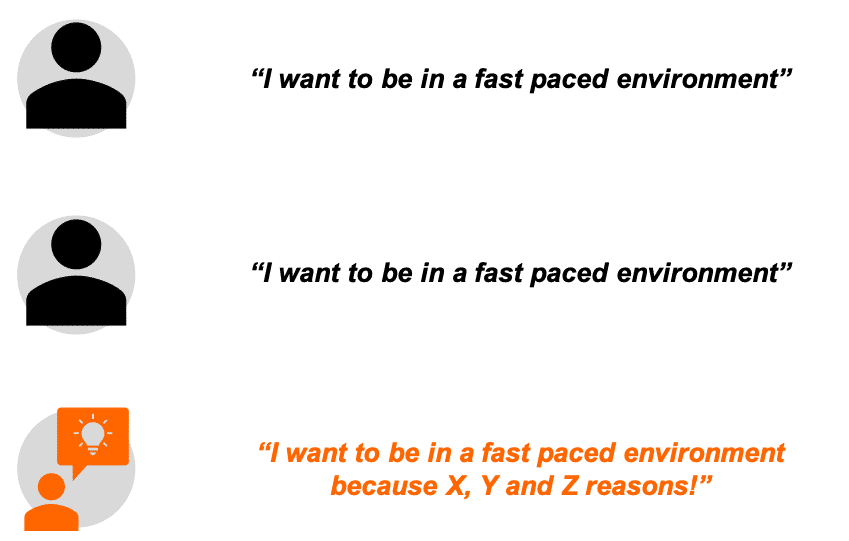
Your answer will have at least one reason, and most of the times 2 or 3 of them.
The thing is: these reasons have to be SPECIFIC and feel REAL to your interviewers.
How to achieve that? Simple, have real examples (that you dug up yourself) to illustrate each reason.
I’m not talking about generic stuff from their official website or webinar. I’m talking real-life examples that show you did the work and talked to real people.
This will give the interviewer more confidence that you want to go into REAL consulting (vs. being a happy consultant from the brochure).
Here’s an example of how Tracy implements that in her answer:
“[…] I think the main thing that draws me into consulting, and specifically to your firm, is the quality of the work you do. I was talking to [Consultant’s Name] in a networking event and he was telling me about how much work goes into each analysis. He told me of everything you do to sure that it will be relevant to the client, that it’s well executed and well presented.
I was so impressed when he was walking me through how you did it that I looked online for presentations you guys did. I found one for a public sector client and I fell in love with the work you did in [Project X]. There was so much detail and quality that I swore to myself I would work here. […]”
See how it’s real? You can’t make that up!
She didn’t simply take the impression that top consulting firms do quality work at face value.
Instead, she actually talked to someone in detail and even dug up a real consulting project document from the web.
(Many public sector projects are available online as governments are often required to make them public).
Failing to be specific and real in your answers, through examples, leaves a series of question marks in your interviewer’s head:
- “Does this candidate ACTUALLY understand the job?” How can you understand the job if you didn’t talk to real people about it?
- “Does this candidate WANT the job?” If you really want this job, why haven’t you talked to real people and dug into the details?
- Can this candidate go in depth in their analyses or do they take things at face value? This is an important consulting skill. You ALWAYS go after data, even if anecdotal data, to have more evidence regarding something being true. You also ALWAYS present that data when explaining your rationale. I know this question isn’t a business question, but it doesn’t matter. They’re looking for people who think in a certain way, and if a candidate walks like a consultant and talks like a consultant…
As you’ve probably picked up, the key to having real, specific examples to illustrate your reasons is by talking to real people.
Principle #3: Your answer should be persuasive
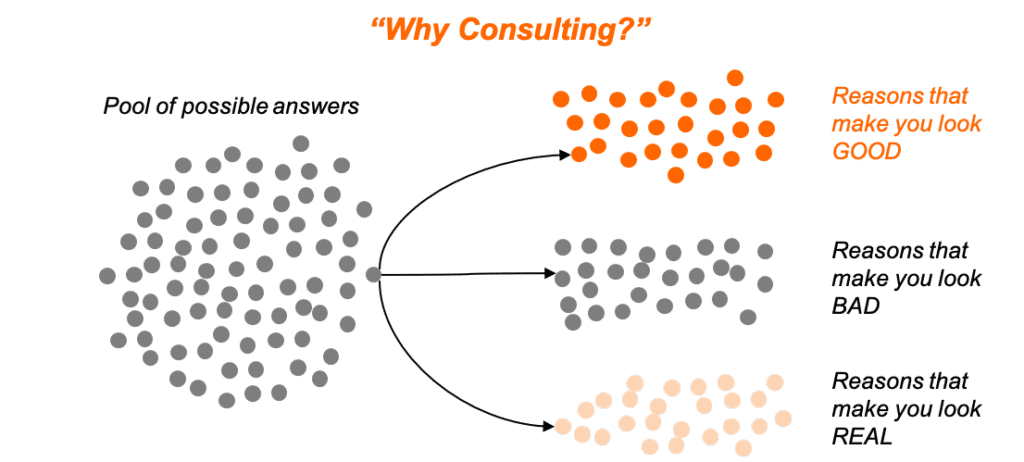
Let’s step back for a moment…
Why are we answering this question in the first place? Why are you reading an article on how to answer this question well?
Oh yeah, right… Because you want the damn job!
Your interviewers know that, so they also expect your answer to be persuasive. If it isn’t, you’re clearly not answering this question in your best interests. This is a signal that you’ll have a hard time “selling” your ideas to clients.
The higher you go in consulting, the more the job is about persuading clients to act.
Not just to take on a new project, but also to implement the old one and get results.
Or to do the right thing that doesn’t feel so good in the short term.
How to be persuasive? Easy! Your reasons for wanting to join consulting must not only be true, but also make you look good.
Saying that you want to learn a lot from senior partners and clients in high-stakes projects makes you look good.
Saying you want to earn the big bucks and have a 7-figure income once you make partner might be true, but doesn’t make you look good.
It’s that simple.
Here’s a list of some reasons that make you look good and some reasons that might make you look bad:
Make you look good
- Learning opportunities (industries, types of projects, skills, seniority, training).
- Impact (type of client, type of project, skill of the firm).
- People (how well you liked the ones you met, how successful and bright everyone is).
- Career opportunities (fast career growth, international opportunities, clear expectations).
- Matches you as a professional (skill-wise, personality-wise, etc.).
Make you look bad
- How much money you’ll make.
- You don’t know what to do and it’s a way to postpone the decision.
- It’s the safe path (“everyone’s doing it”).
- Exit opportunities are great.
- It will look good on my resumé.
Now, one thing few people realize is that you CAN transform a reason that usually “makes you look bad” into something acceptable and highly realistic. I call these reasons the “MAKE YOU LOOK REAL” answers. Here are some examples:
- Instead of “How much money you’ll make”, “It’s a highly paid job that is highly paid because it adds 10X value to clients and I think it’s amazing to have the privilege to work at something like that”.
- Instead of “You don’t know what to do and it’s a way to postpone the decision”, “I have many interests and here I’ll have the chance to learn the craft AND open doors as to what to do in the future”.
- Instead of “It’s the safe path (“everyone’s doing it”)”, “It has so many upsides and little to no downside for my future career”.
- Instead of “Exit opportunities are great”, “Even though I think I will love it here, I know people change paths nowadays and it’s only realistic to think it might happen to me. Coming from consulting I’ll be able to move forward in case I eventually want to change, not take steps back as in other professions”.
- Instead of “It will look good on my resumé”, “I really want to do high impact work and the best way to get access to that kind of work is having this firm’s name behind me”.
Word of warning: I don’t advise you to use more than one of these “make you look real” reasons.
In fact, you don’t need to use them at all.
You can do well in this question just using the “make you look good” reasons.
Still, if you want to add a depth of realism to your answer, you can add one of these on top of the types of reasons that make you look good.
Just be careful with how you word it.
Principle #4: Your answer should be highly personal
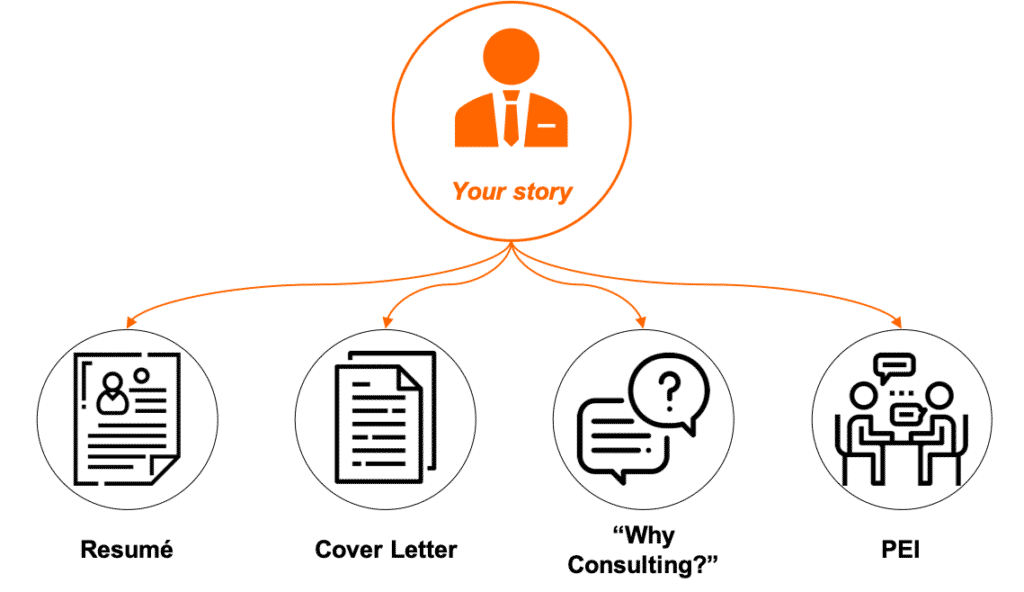
There’s a major mistake people make when answering this question… They mention reasons that sound GREAT, but only for the average candidate.
You are not the average candidate.
Your answer should connect to who you are as an individual. Ideally, the answer tells a story along with Resume, Cover Letter, PEI stories.
So you might say you really want to do this kind of analytical work and crunch numbers and find insights…
But if you’ve never done any of this in your life, your interviewer will find it strange that you’re so passionate about it. How can you be passionate about something you’ve never done before?
Or say you mention that you’d really love working in a fast-paced learning environment… One that exposes you to many types of work and functions and industries…
But then you’ve spent all your life focused exclusively on one area of knowledge and type of work. That’s going to be a bit strange too.
Your answer to this question should tell a coherent story about who you are as a person.
What’s more, the story should be coherent along with all the other things being evaluated… That means your PEI, your Resume, Cover Letter and even your performance in the case.
If you can’t make your reasons personal and coherent with the rest of your story, this raises a huge red flag… Perhaps this candidate just got some tips from the internet on how to answer this question well?
I could’ve written a much shorter article saying: here, give these reasons explained in this way.
This would even work for most people.
But it would also violate this principle and get many people into trouble.
Principle #5: You should be engaged when you give your answer
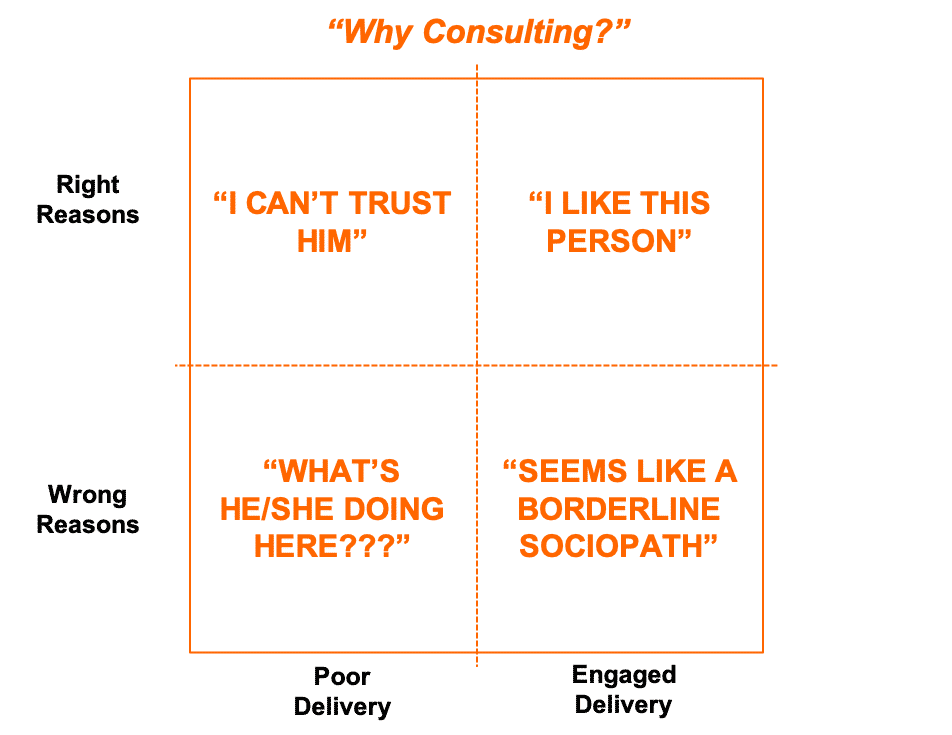
You know that principle that says “show, don’t tell”?
Consultants love it!
If your tone of your voice, your gesturing and your body language don’t tell the same story as the words that come out of your mouth, guess which one your interviewers will take as truth?
This doesn’t mean you need to be over the top to show enthusiasm.
It also doesn’t mean you need to be aware of tone of voice, gesturing and body language as you speak.
All it means is that you should actually CARE about joining a consulting firm and be engaged as you deliver the answer.
Is that a little woo-woo? I don’t know, but still… Showing a bit of your feelings is a thing!
One thing before you get anxious, though: interviewers can interpret context.
Some people are more enthusiastic than others and they know that, so you don’t have to fake anything.
And if you’re a person that doesn’t naturally show feelings, showing just a little bit of enthusiasm goes a long way.
Principle #6: Your answer is stronger if it has logical elements
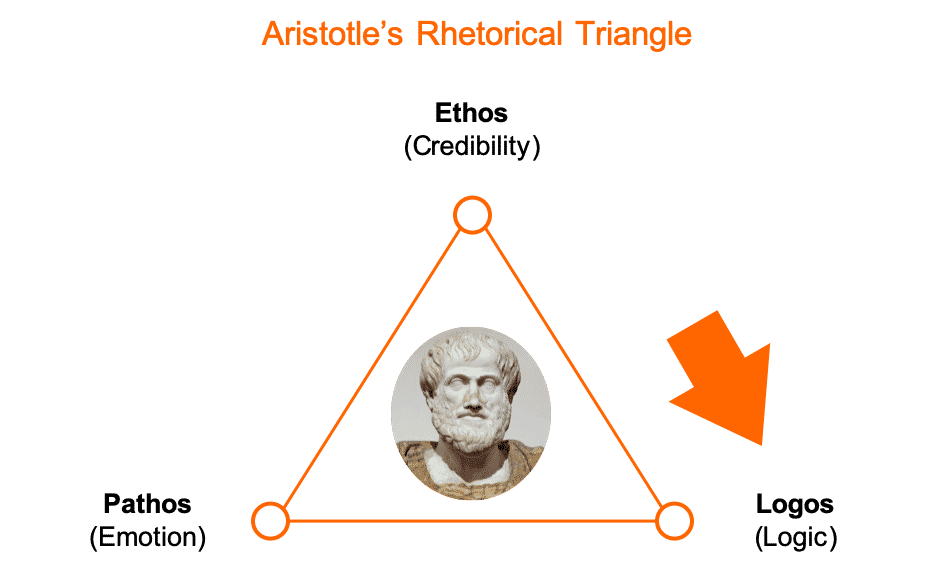
This one’s optional, but consultants love logic so if your reasons have some logic to them, it’s going to resonate.
Here’s how our fictional candidate Tracy shows logic in her answer:
“[…] The 2nd reason relates to the exposure to senior people this early in my career.
My thinking here is that if I’m going to do high quality work, I might as well do it in projects that matter. And I think a good proxy of how much a project matters is that senior people care about it.
So, this along with reason #1 creates a beautiful positive loop here. I do high quality work for senior people in projects that matter. That makes me learn from them and improve my craft. I then get to better work at other high stakes projects. […]”
Now, your logic doesn’t need to be as fancy.
One simple way to show logic in your answer is to show that not only is consulting right for you, but also that other options (banking, PMing) aren’t.
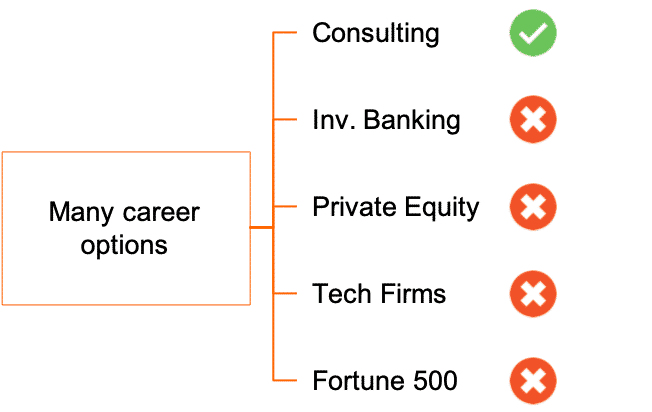
This works well because consultants always evaluate options when helping clients make decisions.
Obviously making a career choice isn’t JUST about logic, so your answer has to have more aspirational components as well. But logic is important too.
Again, no NEED to show this in the answer, but will likely resonate.
Principle #7: Your answer should be specific to the firm you’re interviewing at
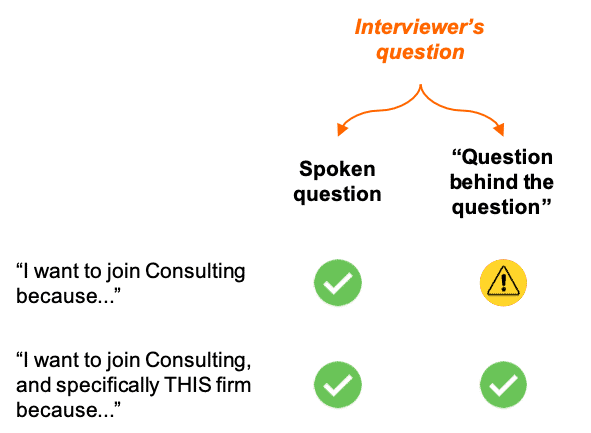
This is another optional principle. – if your answer works best for the specific firm you’re talking to, I’d say you get a few extra points.
This not only gives them extra confident that you want to work with them, it also shows you’ve done your homework.
More importantly, though, it shows a critical skill in consulting: the ability to find the “question behind the question”.
Here’s the thing: consultants don’t really care whether you want to be a consultant or not.
If you end up being a consultant in another firm, for example, they might be happy for you but it’s not gonna change their lives a single bit.
What they care about is whether you’re excited or not to join their firm. And if you know enough about it for the excitement to be realistic (not just naiveté).
Which is why after asking you “Why consulting?”, they’re usually gonna ask you “Why our firm?”
And so, when you anticipate their next question, you’re not only saving their time, but also showing them you know WHY they’re asking you these questions. That you know the “question behind the question”.
In their minds they’re gonna think:
“Wow, if this person does this when talking to me, they’re gonna do this when talking to our clients as well”.
And this is the kind of skill that is highly valuable, and very difficult to test (and teach).
Your job is to show it to them.
Okay, so these are the principles behind the perfect answer.
By adhering to these 7 principles (or as many of those as possible), you implicitly show your interviewer that you’re good to go in the three things they care about when asking you this question.
In case you don’t remember, here they are:
- How enthusiastic are you to become a consultant (so they know you’re gonna be pleasurable to work with and won’t quit three months from now).
- How much you understand about the realities of the job (so they know you’re enthusiastic with the real thing, not the fantasy version of consulting).
- To get an early idea of some softer skills that go into consulting, such as communication, persuasion, professionalism, etc.
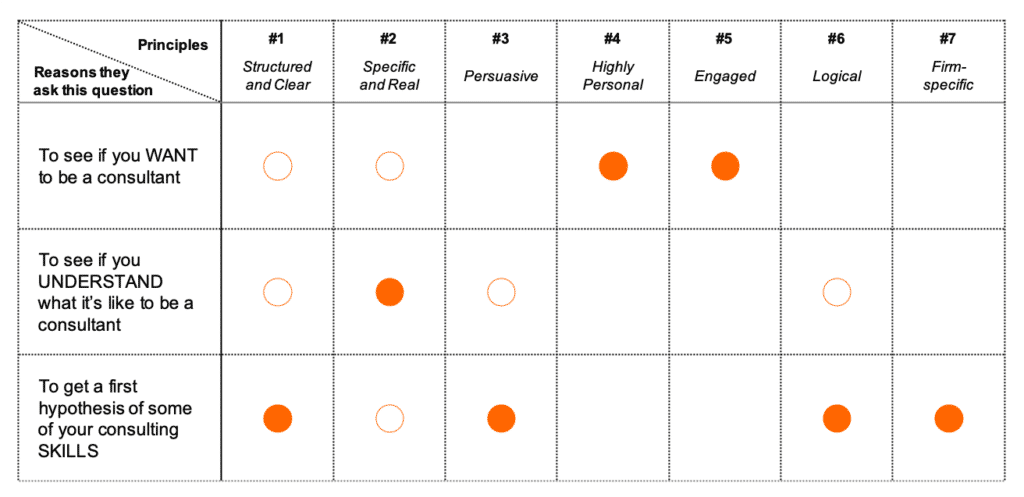
By following our 7 principles, you’ll be able to “check the boxes” in each of the three things your interviewer has in mind when asking you this question.
Now you’re probably asking yourself:
“Okay Bruno, that’s very interesting, but how do I craft an answer that ties all of these principles into one coherent whole in practice?”
Glad you asked – in the next section I’ll wrap it all up for you into one systematic way to create your answer.
The Anatomy of the Perfect Answer
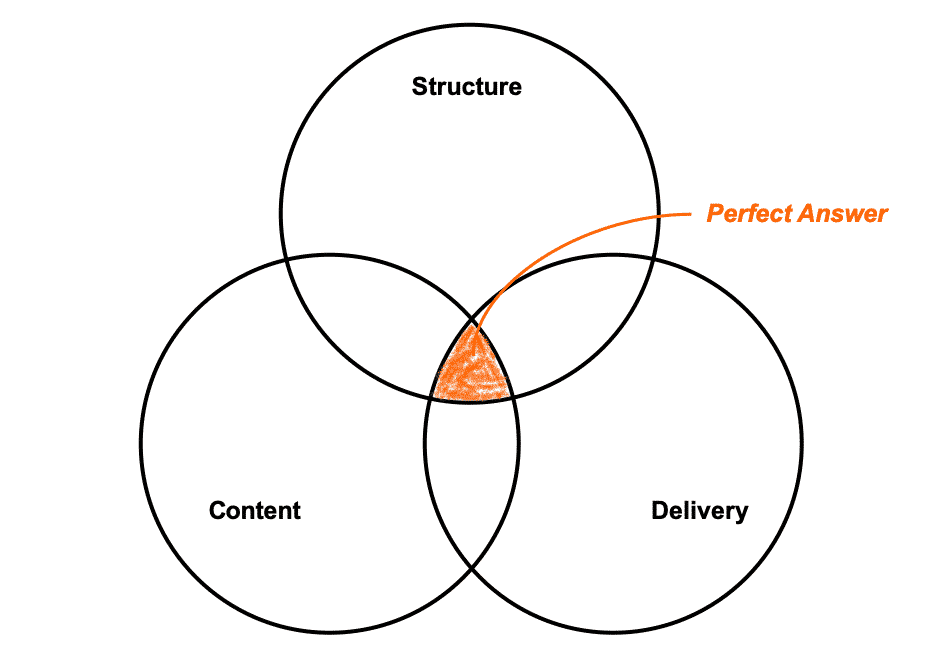
In this part of the article I’ll show you the anatomy of the perfect answer.
This will be your guide to craft an answer that has will make you shine in the interview.
A good answer to the “Why consulting?” question has three elements: Structure, Content and Delivery.
The role of Structure is to make things clear to the interviewer and show you’re a structured thinker (and communicator).
As you’ve probably learned from training cases, Structure is one of the main things they test throughout the process. And they want you to be structured both when the stakes are high (such as during the case) and when they’re low (like when they ask you an innocent fit question).
There’s no better place to start showing your interviewer you can do that than the first question they ask you.
The role of Content is to show you’re well informed and have good reasons for wanting to join consulting. Reasons that are real and connect back to who you are. Reasons that tell a story of who you are as a candidate
The role of Delivery is to make the content credible.
Interviewers will believe what you show more than what you say.
This is also an opportunity to establish a human connection with the interviewer and show you’re an interesting person.
If your answer lacks one of these three elements, it’s gonna look “weak”.
If your answer has all these three elements, it’s gonna be outstanding compared to all other candidates.
And best of all: it’s fairly easy to tick the boxes in all three elements.
Let me show you how.
Structure
In general, your answer to “Why consulting?” should be organized by the 2-3 different reasons you want to join a consulting firm.
I don’t recommend you to only have one reason (although it’s good practice to have one KEY reason). More than 3 reasons is just gonna waste everyone’s time.
For each reason, you should have one or more specific, real-life examples as evidence that consulting in fact has that reason.
There’s no need to have fancy or over the top examples, but you do need something concrete.
Ideally, each reason also has a connection about why that reason is important to you. If you can show real-life evidence that PROVES that the reason is important to you, even better.
Here’s a visualization of how this question should be structured, with Tracy’s answer example within it:
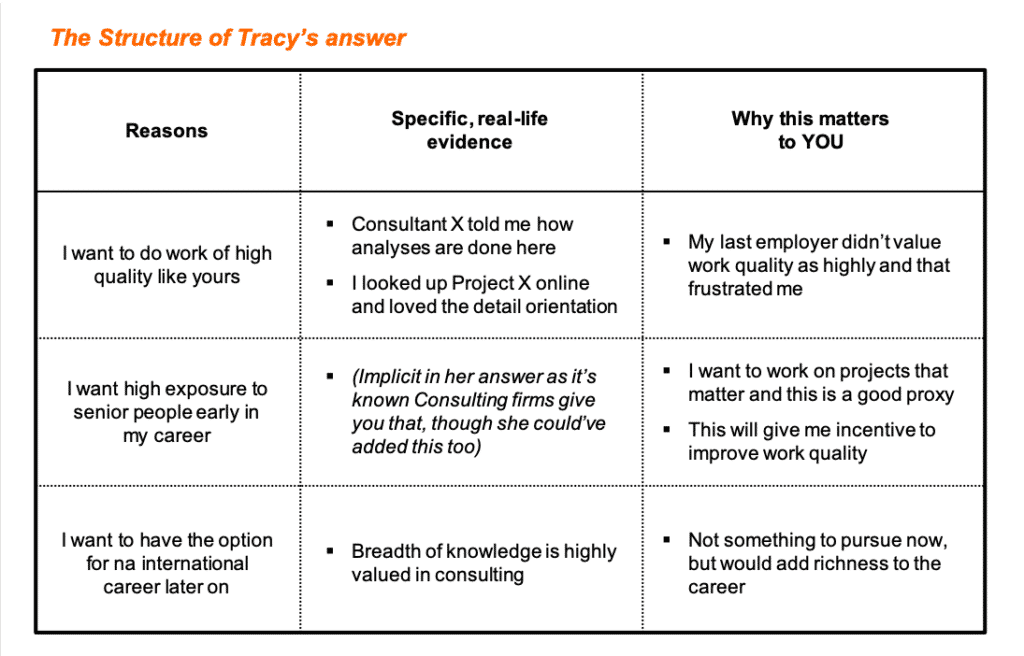
Tracy’s answer isn’t “perfect” (no answer is), but it’s well structured and has compelling arguments. Most important, knowing its structure, she’d be able to fill the gaps as the interviewer asked her more questions.
If you’ve been practicing cases already, you’re gonna notice that this structure is not so different from a case interview structure…
Each reason for joining consulting can be thought of as a hypothesis.
You haven’t worked in consulting yet, so you can’t know for sure you’re gonna find whatever you’re looking for there. But you have a strong hypothesis.
Each hypothesis has some evidence that it’s true, which is the “second layer” of your structure.
Finally, the third layer connects that reason to you personally. It represents an explanation of WHY that hypothesis is important.
This structure works so well because it’s exactly how consultants think. Not just in cases, but in any decision-making process. Consultants think like consultants across the board, not just when solving problems for their clients.
Content
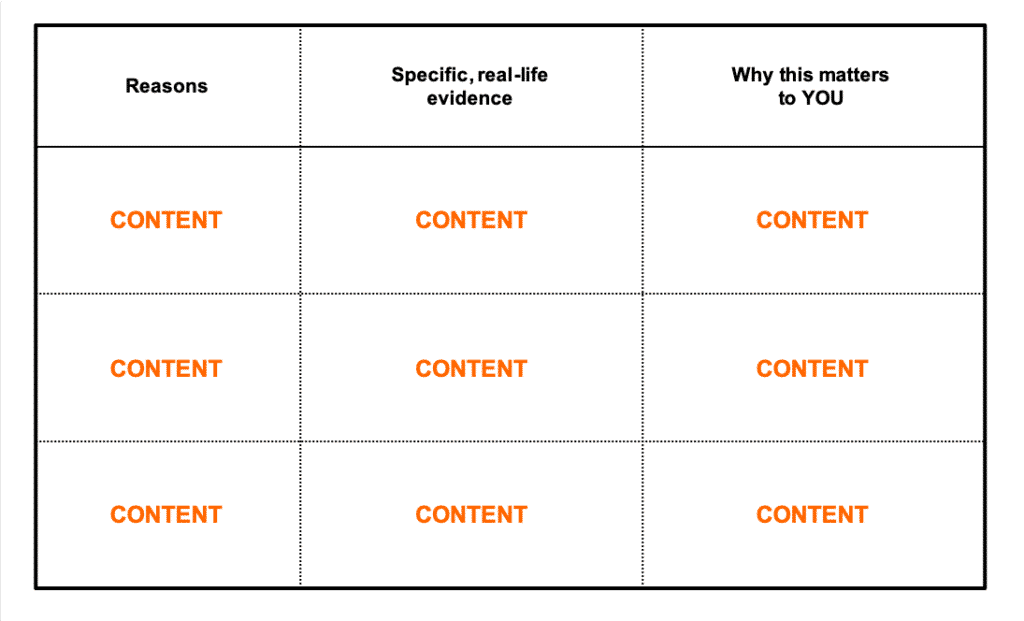
The content is what goes within each “box” of your structure (if you think in a scheme like I did above).
There are 5 ways to make your content better, all deriving from 5 of the 7 principles from the last section. Here they are:
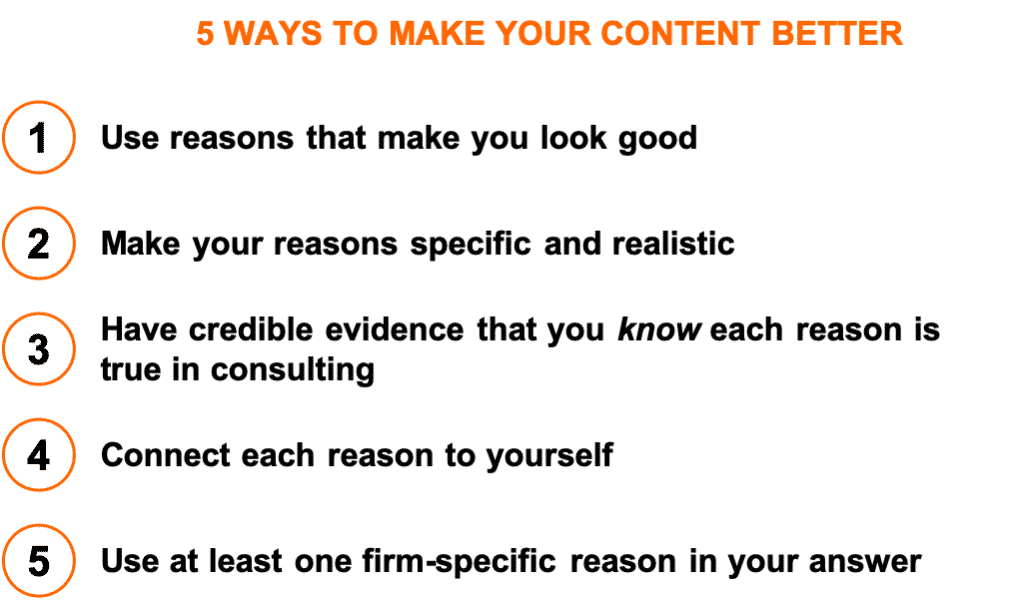
You can find exactly how to incorporate each of these 5 ways in the last section, “7 Principles Behind the Perfect Answer”.
But there is one of these principles that makes most candidates uneasy: Connecting each reason to yourself. A lot of people find it hard to grasp how exactly to do that.
There are two trustworthy ways to do so: by soft-selling your skills and by showing your passion.
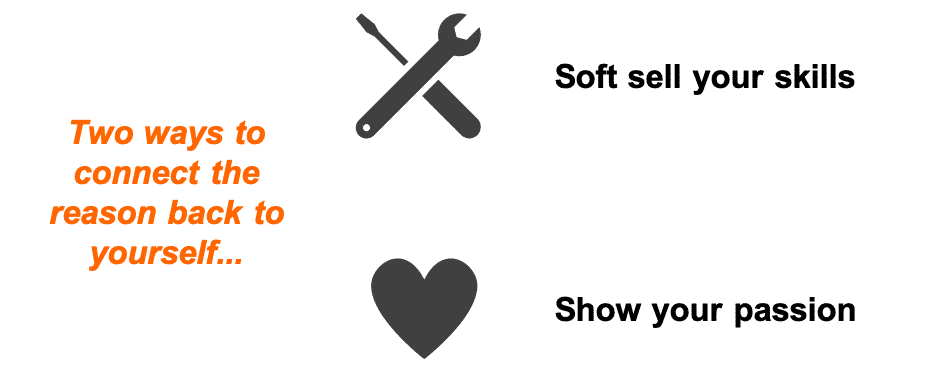
For example, you could talk about a job you did in the past that was in the sweet spot between analytical and relationship-building work. You can talk about how well you did it, what results you’ve achieved and the recognition you got from your boss.
This is the “soft selling your skills” part.
You can also use the same example to show your interviewer how much you LOVED working with that, how it was in the sweet spot between brains and heart to you and how you’d look forward to work in such a way every Monday morning.
This is the “showing your passion” part.
Connecting each reason back to you, either through a skills perspective or through a passion perspective (or both) is important because it makes the answer about YOU.
The question is not “Give me some generic reasons why someone would want to work in consulting”.
The question is: “Tell me about why YOU personally want to work in consulting”.
It’s not a test where you have to get the “right answer”.
It’s a personal question with professional implications.
Alright, that said, let me show you in Tracy’s answer how she nails down the content part of her answer:
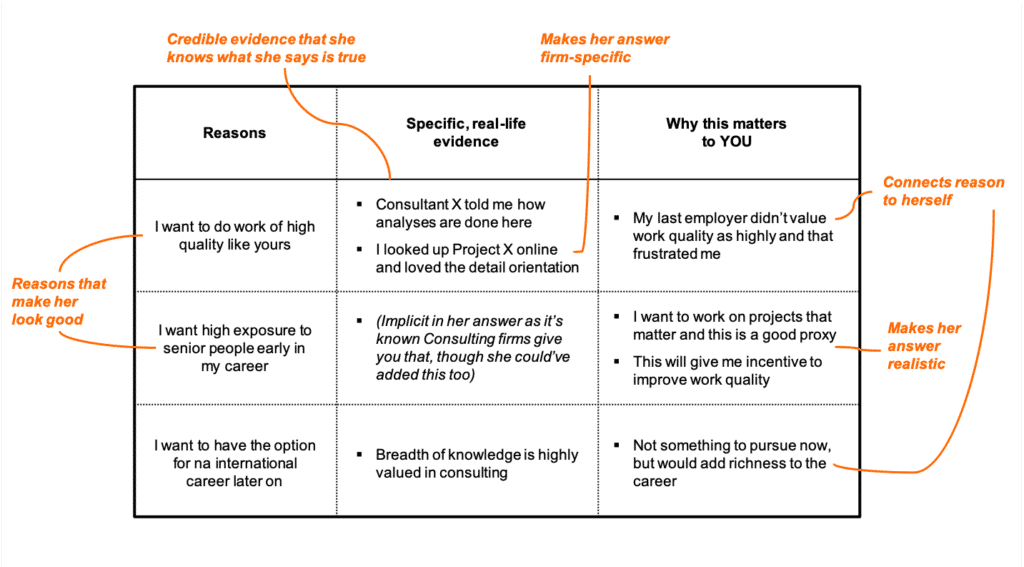
Tracy’s answer incorporates all of the key things that make content compelling in her answer in one way or another.
Delivery
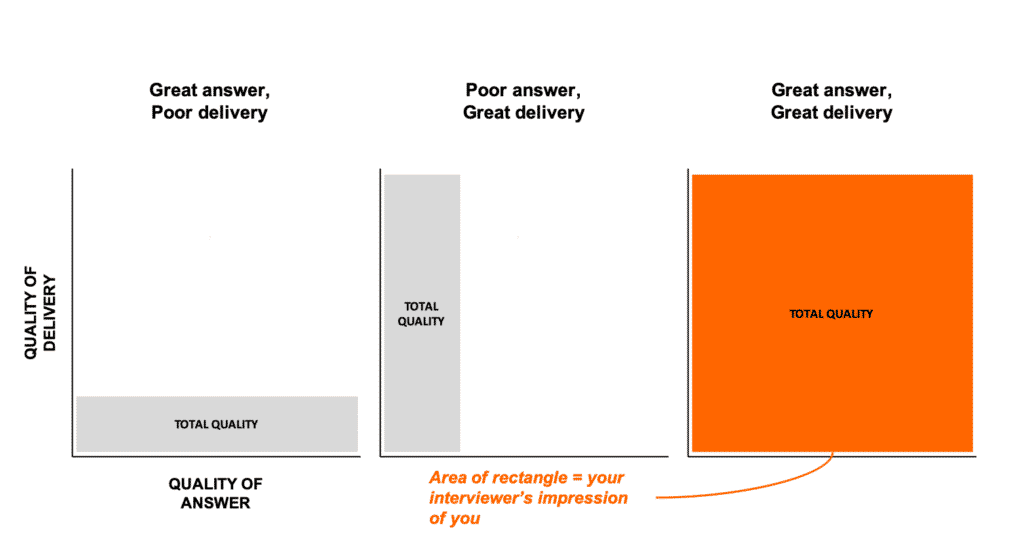
You can have the best structure and the best content in the world, but if your delivery is poor, you’re selling yourself short.
There are both practical and softer concerns regarding the delivery. I’ll start with the more practical concerns, and then move one to the softer skills.
First, one thing that concerns a lot of people: TIME.
As we saw in the beginning of this article, a very short answer will take 30 seconds of the interview. A really long one, such as Tracy’s, will take up to 3 minutes.
You can comfortably take up to 3-4 minutes to give your answer.
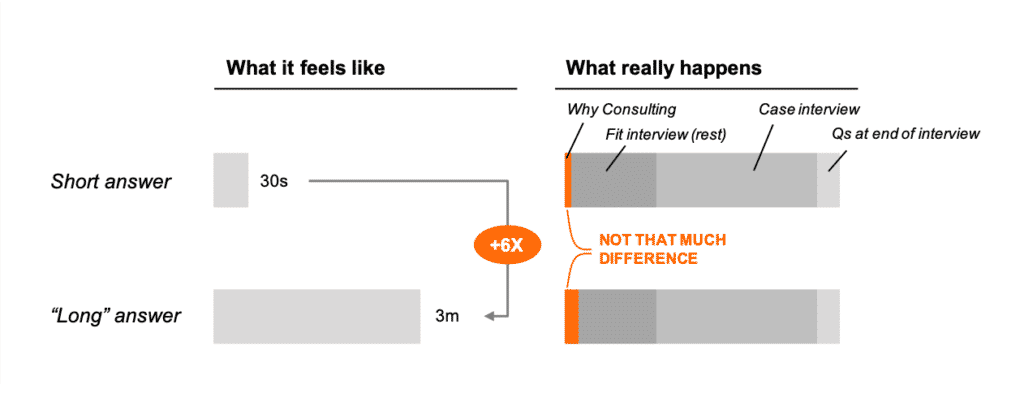
As this question takes so little time to answer, the extra time you may spend to give a REALLY GOOD answer to “Why consulting?” doesn’t make a big difference in the grand scheme of things.
Your interviewer might ask a few follow-up questions and merge this questions together with the “Why this firm?” question or some other resume-style questions.
(Example: “You mentioned you want to focus on learning new skills here, and I see you’ve worked for [Previous Employer] before. Can you give me an example of a skill you’ve learned there?”)
The fit portion of the interview generally takes about 20 minutes in consulting. Taking 3-5 minutes for this one (including follow-up questions) isn’t too much .
So focus on answer quality. Give your interviewers a lot of signals that you REALLY want to work there and that you know what is it like.
An exception is McKinsey.
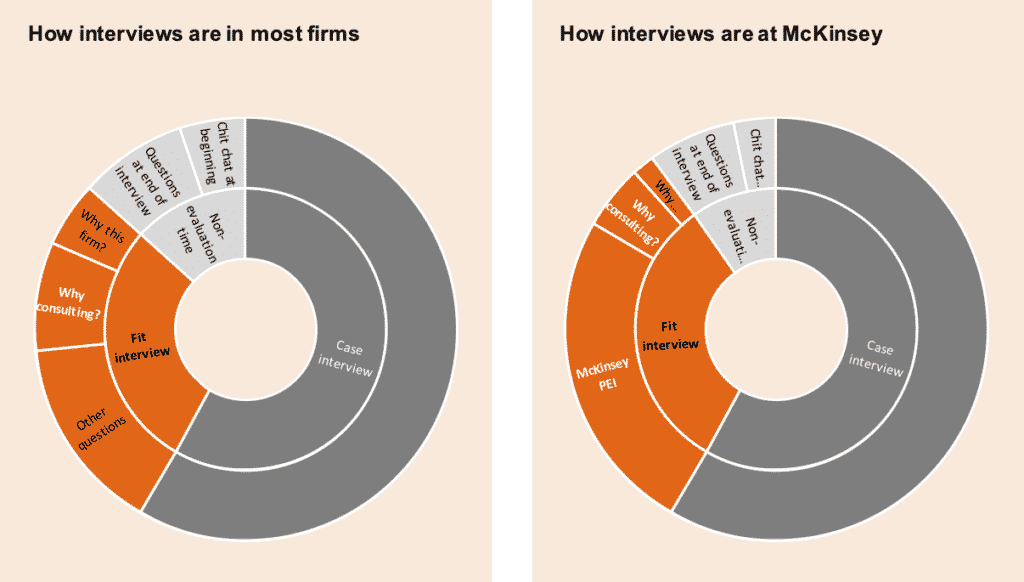
The McKinsey PEI is a “special” type of fit interview where they dedicate ~15 minutes to one (and only one) question related to a past experience. Because of it they downplay other fit questions.
McKinsey has a different type of fit interview called the Personal Experience Interview (PEI).
It’s an in-depth question about a specific situation you’ve lived. That question alone can take up to 15-20 minutes of your whole interview.
For this reason, we recommend you keep your answer to “Why consulting?” on the shorter side at McKinsey.
Another question that people have about the delivery…
Whether you’re at McKinsey or you notice your interviewer is impatient, how do you go about making your answer shorter?
The easiest way is to take advantage of your structure to do that.
You can vary the depth of each reason and have a shorter answer given that.
Here’s what I mean by that:
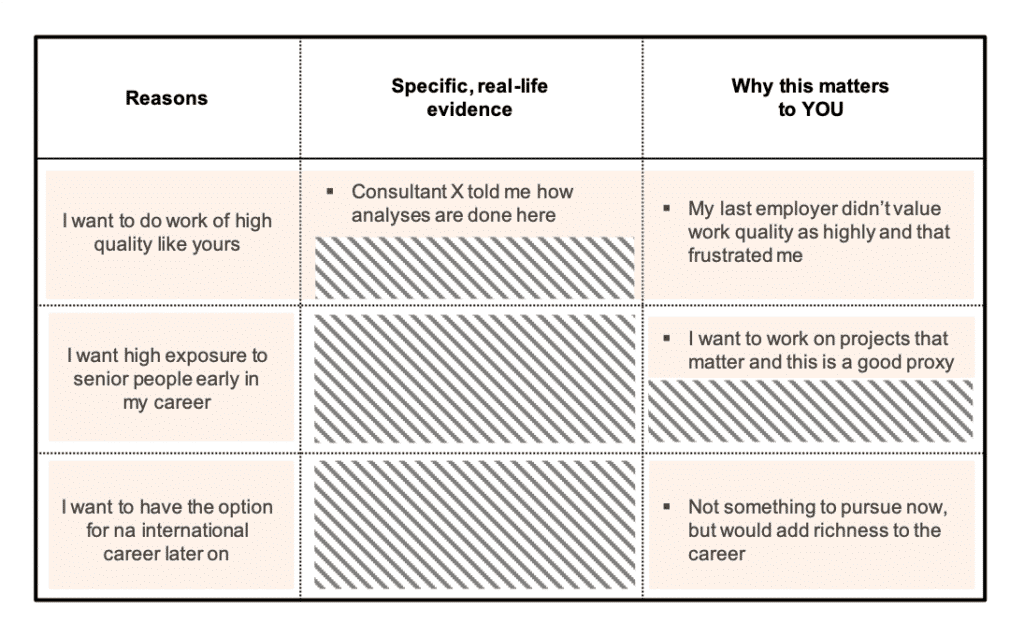
You can pick and choose which details you will incorporate to your answer in order to make it shorter or longer.
As you can see, just varying the depth of your answer for each reason, it’s possible to slash minutes out of your answer.
You’ll still want to go in depth in at least one of the reasons, though. You want to show the interviewer you’re a candidate that gives thought to your decisions.
Another practicality of your delivery is what to speak first…
In which order should you say things?
Should you say all your reasons first and then go in depth into each one?
Or is it better to dive into each reason and thoroughly explain each before moving on to the next?
My advice is similar to when communicating a framework during a case interview: give a 10-15 second overview of your answer first and then dive deep into each bucket.
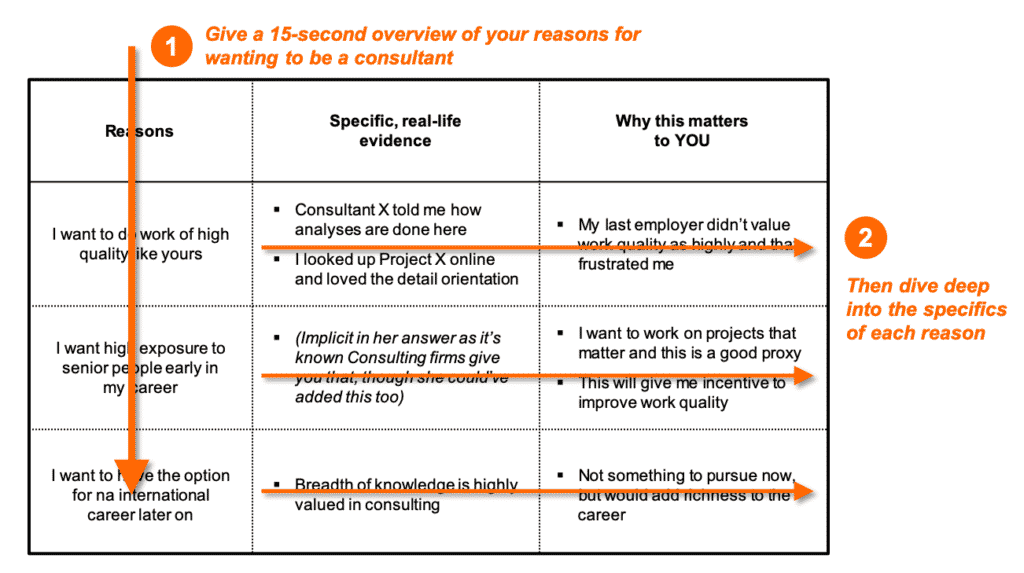
In answering the “Why consulting?” question this means briefly stating all your reasons, then quickly making the switch to going in depth in each reason.
Here’s how Tracy pulls that off:
Tracy: “You know, that’s a really good question. I think it’s three main things. First, the quality of the work you do. Second, the high exposure to senior people this early in my career. Third, the opportunity for an international career later on.
Let me explain why each one is important to me.
I think the main thing that draws me into consulting […]”
Here you can see this in action in a graphical way:
Finally, what everyone thinks when thinking about the delivery…
Nonverbal communication.
You’re probably heard the statistics… Nonverbal communications represent about two thirds of the meaning you convey.
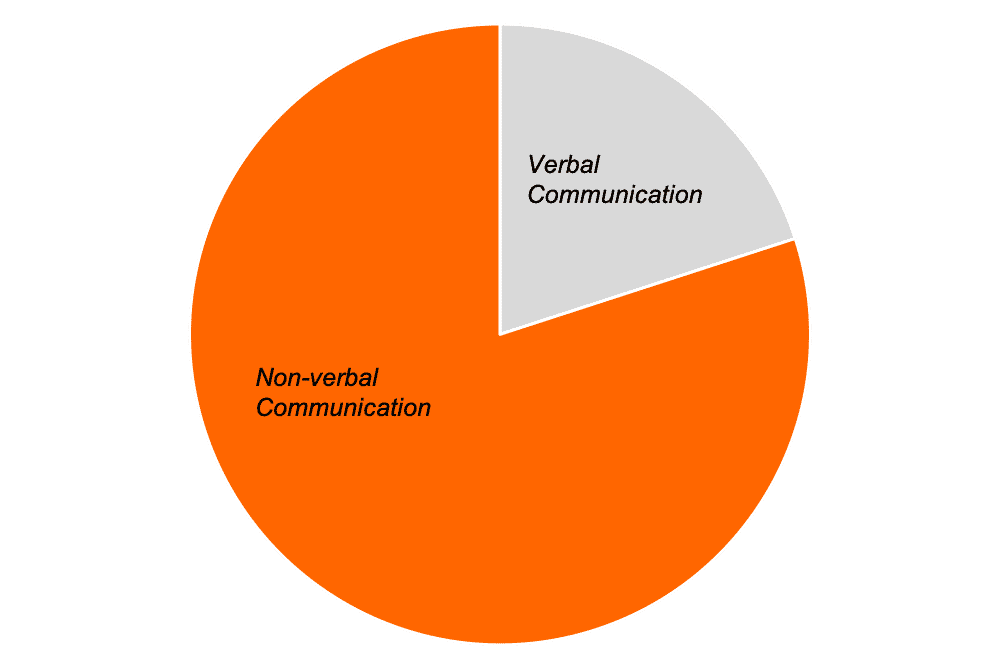
I honestly don’t know if it’s two thirds, or 72% or how people even calculate that… But here’s the rationale: giving an excellent argument while looking and sounding like a robot won’t get you much credibility.
(Doubt it? Take a look at this amazing breakdown on why it’s hard to trust Mark Zuckerberg.)
Okay, so non-verbals is important. You knew it already… But what should you do? It’s hard to give concrete advice here, isn’t it?
I’ll assume you’ve got your bases covered – you’re well dressed, clean and looking professional.
There are only four things you have to worry about:
- Posture
- Facial expressions
- Gesturing
- Tone of voice
Before you try to fix anything, do a reality check. Is any of these even an issue for you? Most people who apply to consulting DO NOT have a problem with them.
If you do have an issue with any of these, go to Youtube and look up for videos that show you how to fix it. Youtube’s great for this type of thing because you can see and listen to what people do.
Be ready for "come-back questions"
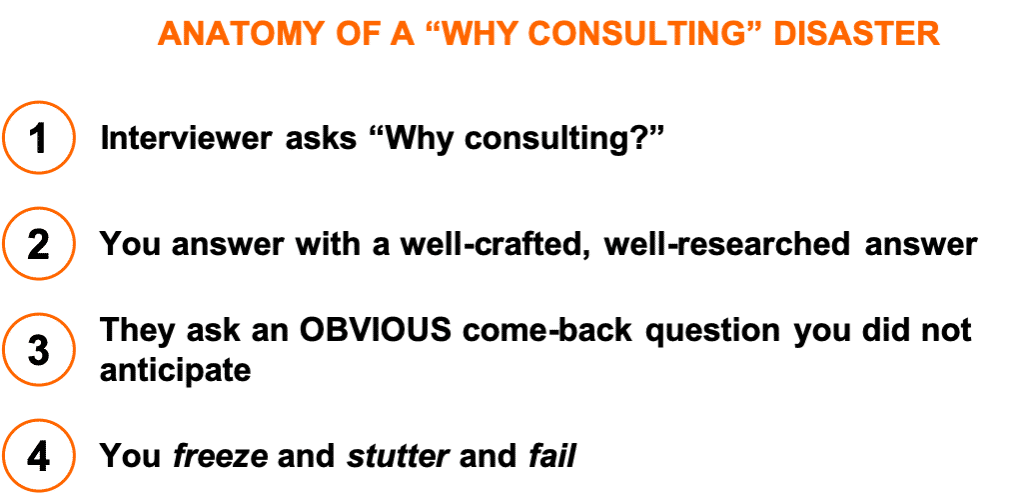
Some interviewers are tougher than others.
And some interviewers will have “come-back” questions for you. They’re usually based on your background.
For example, if you worked a few years in Investment Banking, they might ask things like:
- “Are you sure you’re gonna be able to work in a collaborative, non-competitive way in consulting?”
- “Why would you give up the opportunity to make as much money as you were making to work as much and earn less?”
Or if you come from a PhD program, they could ask:
- “You know you won’t have as much time to do your analyses here, right? You’ll have to be comfortable with 80% correct answers… What makes you think you’ll feel okay with that?”
Or if you’re right out of undergrad:
- “If I were a client with decades of experience in my industry, why should I trust your advice?”
In these questions they’re testing your true understanding of what consulting really is. They’re also seeing how you handle tough questions.
Most interviewers don’t do this, but why not prepare for the worst?
You can do so in two steps:
Step #1: Think of the main objections an interviewer can come up with given your situation/background.
Step #2: Create a polite, firm and credible rebuttal.
Really, is it that simple.
I wouldn’t waste more than 5-10 minutes on this even if you’re preparing for months for your interviews.
Still, doing this exercise is certainly worth 5-10 minutes of your time. Since some interviewers raise these objections, better to have thought through an answer to the most obvious ones.
The 80/20 way to practice for "why consulting?"
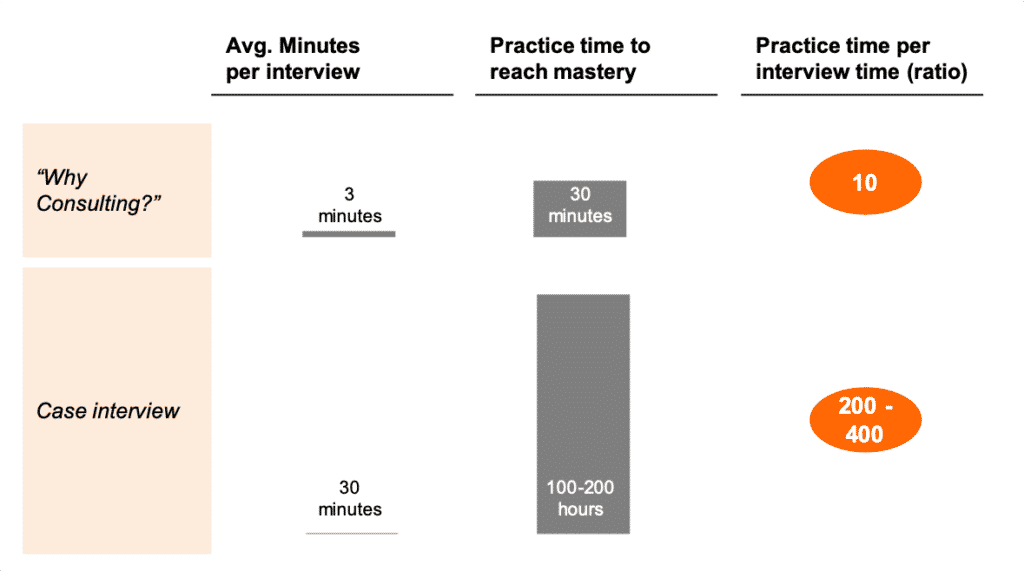
You can get all theoretical and follow all the principles in this guide, but still do poorly.
Why?
Because of lack of practice.
If the first time you’re answering this question is when you’re nervous for your first consulting interview, things are likely to not go well.
Doubt it?
When I was a teenager I had a hard time saying “hi” to girls simply because I was nervous!
And believe me, I was a very talkative kiddo. My problem was not in the “uttering words out of my mouth” department.
As I said in the beginning of this article, you are likely to answer this question in pretty much all consulting interviews you go to. If you interview at 3 firms and have 6 interviews per firm, that’s an astonishing 18 times!
That means you’ll get a lot of practice along the way. Once you have your final rounds you’ll have had the opportunity to answer it multiple times.
This makes it less critical to practice the delivery of this question as much as cases. It is a less critical question, and you’ll be practicing it plenty already.
Still, you should still do 80/20, focused preparation. There are three main reasons for that:
- Thirty minutes practicing this question is already above average, as most people don’t even prepare an answer for it. It’s an easy way to differentiate yourself.
- Thirty minutes of practice = 10 deliveries of a 3-minute answer. Doing that before your first rounds will virtually guarantee a partner-level answer in your first ever consulting interview.
- You’ll be able to avoid common mistakes that are hard to catch during the interview itself. These include being monotone, being too enthusiastic and seemingly fake, showing lack of insight due to having a hard time remembering your stories, etc.
So how exactly to practice?
Simple:
Step #1: Have your answer (or an outline of it) written down in a structured format. Do it as I’ve shown you in this article. Have 2-3 reasons and for each, 3 layers of depth (reason, evidence, why it’s relevant to you).
Step #2: Practice in front of the mirror (or recording on your smartphone) 3-5 times. For each time you deliver your answer, run through a checklist of the 7 principles from this article to see if you “check” most of them. Pay special attention to your energy and enthusiasm levels. Make sure you summon the actor within you to emphasize the points you want to.
Step #3: For 2-3 mock case interviews, ask you peer to test you on the “Why consulting?” question. It will only take a few minutes and you’ll be able to get real feedback from another person.
Adding your own "twist" to your answer
I guess most people reading this will be comfortable using the system I laid out in this article to give the perfect answer to this question.
It works, after all.
But some people will want to add their own twist to the answer.
They’ll want to show their personality.
If that’s you, read on.
First things first… Do I advise you to do that?
The answer: sure, but only if it really comes naturally to you.
If you’re a naturally funny person, and you want to crack a joke, do it!
If you’re a natural born storyteller and you want to start your answer with a personal story before diving into the reasons themselves, feel free to do it.
My only piece of advice here is to not force any of this.
If this is not you, just stick to the safe path. You’ll be able to show your personality in the rest of the interview.
But if this IS you, feel free to play around with your answer. Just make sure you do it only once you got the basics developed.
Conclusion
I’d be lying to you if I told you this is the most important question of the interview.
If you do poorly in the case, a great answer to this question will not save you.
And if you do well in the case and in the other fit-related questions, a mediocre answer to this question will hardly affect your chances of getting the offer (although believe me, some people do screw up).
This is hardly the question that will make or break your chances. It’s more like a pass/fail type of question. If you didn’t screw up, you’re probably good.
So why bother?
And why did I even write such a long article going into all the nuances of how to answer this question perfectly?
Because even though this is not the kind of question that is critical to your interviewer’s “performance checklist”, it is for their “smell test”.
Here’s the deal: even if you do fantastically well in the case, tell incredible fit stories and has an outstanding resumé, even if you check all the boxes… If your interviewers get together and agree the “something didn’t feel right”, you’ll probably be rejected.
Consulting firms are super risk-averse in recruiting. They’d gladly pass 2-3 perfectly good candidates to avoid recruiting a bad apple.
So this is the real role of “Why consulting?”. It’s a fantastic question for your interviewer to “feel” your intentions before jumping into the hardcore evaluation aspects.
And so, it’s a fantastic opportunity for you to give them a great first impression, and leave them biased towards hiring you in just a few minutes.